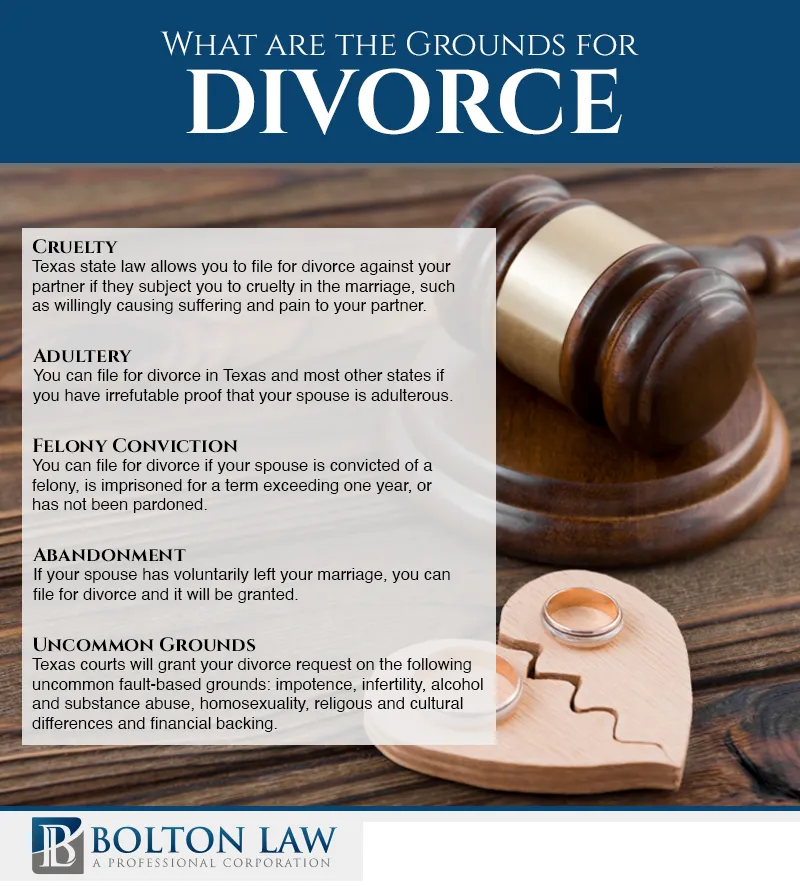Whether or not you are initiating the divorce, it’s critical that you hire an exceptional divorce lawyer in The Woodlands to represent you.
You can trust the family law attorneys at Bolton Law to provide you with top-notch legal representation throughout your divorce in The Woodlands area and beyond.
Grounds At-Fault Divorce Proceedings According to Texas Law
Texas recognizes both fault-based and no-fault divorce.
Here are the primary grounds for initiating the divorce process:
Cruelty
A spouse can file if they’re subjected to mental or physical cruelty in the marriage. Each case is determined based on its unique facts under family law.
Adultery
Divorce can be sought with evidence of a spouse’s infidelity. While direct evidence like photos isn’t necessary, circumstantial evidence such as bank statements indicating hotel stays or gifts can be used.
Felony Conviction
A spouse can seek divorce if their partner is convicted of a felony and is imprisoned for over a year. However, if the filing spouse’s testimony was pivotal in the conviction, the divorce petition might not be granted.
Abandonment
If a spouse has been away from the marriage with an intent to abandon for at least a year, the other can file for divorce. If the departing spouse returns briefly without intent to reconcile, the one-year clock resets.
Uncommon Grounds For At-Fault Divorce in Texas
Impotence
If a spouse becomes impotent after the marriage and it hinders marital relations, it can be grounds for divorce. The impotence must be continuous and incurable.
Infertility
If a spouse is unable to bear children and this wasn’t disclosed before marriage, it might be a basis for divorce.
Alcohol and Substance Abuse
Chronic abuse of alcohol or drugs, leading to an insupportable marriage, can be grounds for divorce.
Homosexuality (in heterosexual marriages)
If one spouse exhibits homosexual tendencies and the couple had entered a heterosexual marriage, it could serve as a reason.
Religious and Cultural Differences
Extreme differences in religious beliefs or cultural practices, which make marital life insupportable, can be a basis for some divorce cases.
Financial Neglect
If a spouse can but doesn’t provide financial support to the other, it may be considered a ground for divorce.
For specific guidance on your situation and family law issues, consider consulting a divorce attorney at Bolton Law in The Woodlands, TX.
What is a No-Fault Divorce?
A no-fault divorce is where none of the spouses are to blame for the divorce. You don’t have to prove that your spouse has done something wrong. Over the last couple of decades, no-fault divorce proceedings have become more popular than fault-based divorces in The Woodlands because they are less costly and take less time
In Texas, common grounds include:
Insupportability
The relationship is intolerable due to irreconcilable conflicts with no realistic hope of reconciliation.
Living Apart
Spouses can seek divorce if they’ve lived separately for over three years without any cohabitation during that time.
Confinement in a Mental Hospital
Divorce is possible if a spouse has been institutionalized for three years due to a severe mental disorder with little hope of recovery.
For more details, contact our The Woodlands office.
What is the Difference Between Legal and Physical Child Custody?
Child custody is a focal point in divorces, requiring clarity on residency and decision-making for the child. Contact us at Bolton Law to safeguard parental rights. Courts usually lean towards joint child custody arrangements, which encompass both legal and physical, indicating the child’s primary residence.
How is Child Support Determined?
If you are planning a divorce, you have probably thought about child support. You should know that support is the child’s right. You are expected to meet your obligations until the child is 18 years of age or until they graduate high school. Sometimes, the court may direct you to continue paying support until the child is out of college.
Texas courts utilize a specific formula that considers several factors when calculating child support to eliminate questions of unfairness.
The factors are:
Income of Each Parent
At the beginning of every child support case, both parents are required to submit and exchange recent W-2 tax documents, paystubs indicating salary and tax exemptions, and any other documents showing income such as wages, tips, rental income, bonuses, and overtime pay. You will contribute more towards child support if you have a higher income.
Dependents
You and your spouse must provide dependency information to the court. If one parent pays child outside their current marriage, the court will consider this in the child support case.
Overnight Visits
The child support formula will also consider the overnight visits the child will spend with each parent. The court will award the custodial parent more child support.
Health Care Costs
The parent whose healthcare plan takes care of the child’s health care costs usually receives credit for the amount paid in the child support formula. The parent must present evidence of the payroll deduction to the court to get the credit for the child’s health insurance.
Child Care Expenses
In Texas, child care costs between $10,000 and $50,000 a year. The other parent will fully cover the cost of child care if the custodial parent bears the burden of child care all the time.
How Will Property Be Split in the Divorce?
In Texas, property division laws guide the division of marital assets during a divorce. Assets are categorized as community property, owned jointly, or separate property, owned individually. While community property is split evenly, separate property remains untouched. It’s beneficial for spouses to agree on dividing community property equally without court intervention, as court decisions might lead to uneven percentage-based divisions.
What is Equitable Division and How Does it Work?
Equitable distribution laws allow judges to divide marital property based on each spouse’s income and contribution. Typically, the higher-income spouse receives two-thirds of the community property. However, spouses can decide their own division without court involvement. A divorce lawyer in The Woodlands can assist in achieving a mutual agreement without litigation.
What Happens to the House?
Four primary outcomes exist for a house owned by a couple during a divorce.
Selling
This is where the house is put on the market, and you and your spouse get to divide the proceeds of its sale. Most divorcing couples go for this option as it comes with no long-term obligations, such as maintenance payments for either party.
Purchasing the Full Share of the Equity
In this case, you can choose to buy the equity of the house that your spouse owns. This means you get complete control of the house and take on the whole mortgage — if any. You can opt to stay in the home or rent it.
Maintenance
Here, the more financially stable spouse moves out of the house and finds a new place to stay while continuing to pay their share of the mortgage. Most parents consider this option during divorce if their children are still living in the house.
Transferring the Property
If you jointly own your home as a couple and the mortgage is fully paid off, you can transfer the property to your spouse as part of the general financial settlement.
How Long Will Divorce Take?
The duration of divorce proceedings depends on the method chosen and the cooperation between spouses. Mediation and arbitration can finalize a divorce in about six weeks, while court proceedings might extend to a year or more. An uncontested divorce is typically quicker than a contested one, averaging six weeks to one year.
Divorce Process In Texas
How Much Will a Divorce Lawyer in The Woodlands Cost?
Each divorce case is unique. Consequently, calculating the cost in advance can be tricky. However, most divorce attorneys in The Woodlands, TX, charge between $3,000 and $5,000 to initiate a divorce proceeding, and then you will have to pay roughly $300 to $500 per hour moving forward.
Bolton Law | Your Top Woodlands Divorce Lawyers | Call Today to Get Help
As you might have noted, divorce is a pretty complex matter. You need first-class, highly experienced divorce lawyer in The Woodlands to represent you and boost your chances of ending up with a favorable outcome.
Call today to get in touch with the most experienced Texas divorce lawyers at Bolton Law to discuss your legal options. Let us help you settle your divorce amicably.
Get Directions
2441 High Timbers Dr #400, Woodlands, TX 77380
Coming from North Woodlands:
Starting from North Woodlands, head south on Kuykendahl Rd. Continue on this road, crossing Woodlands Parkway. After several miles, turn left onto Lake Woodlands Dr. Drive along Lake Woodlands Dr until reaching Grogan’s Mill Rd, then turn right. Follow Grogan’s Mill Rd before making a left onto High Timbers Dr. Bolton Law Firm is located at 2441 High Timbers Dr #400, on your right in the office complex.
Coming from East Woodlands:
If you’re in East Woodlands, begin by traveling west on Rayford Rd towards I-45. Take the ramp onto I-45 N and drive for a short distance. Exit at 77 for Lake Woodlands Dr/Research Forest Dr/Tamina Rd. Merge onto N Fwy Service Rd and then take a slight right onto Lake Woodlands Dr. Turn left onto Grogan’s Mill Rd and another left onto High Timbers Dr. Bolton Law Firm will be on your right at 2441 High Timbers Dr #400.
Coming from South Woodlands:
From South Woodlands, start by driving north on Grogan’s Mill Rd. This route will take you through central parts of Woodlands. Continue on Grogan’s Mill Rd, crossing over Lake Woodlands Dr, then take the next left onto High Timbers Dr. Bolton Law Firm is situated in the office complex on your right at 2441 High Timbers Dr #400.
Coming from West Woodlands:
When coming from West Woodlands, begin on Woodlands Parkway heading east. Continue on this parkway until you reach Grogan’s Mill Rd. Turn right onto Grogan’s Mill Rd, then take a left onto High Timbers Dr. You’ll find Bolton Law Firm in the office complex on your right at 2441 High Timbers Dr #400.










